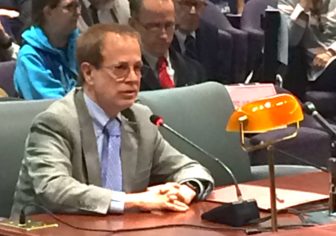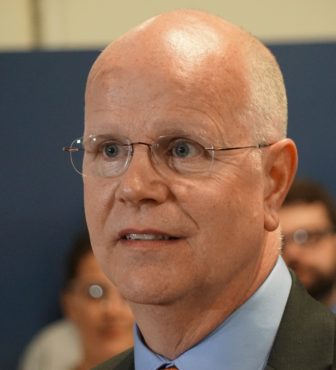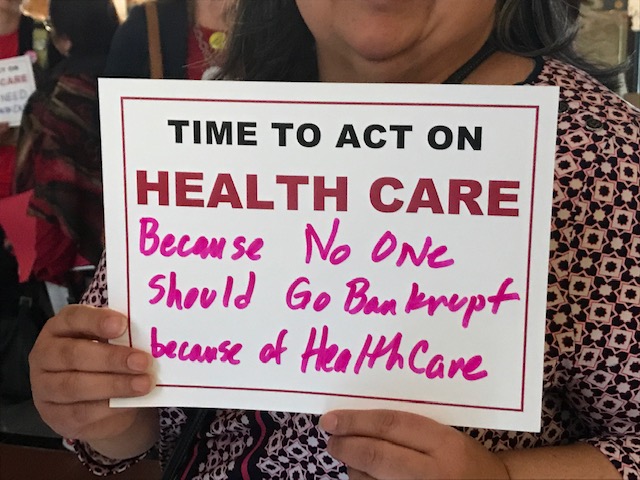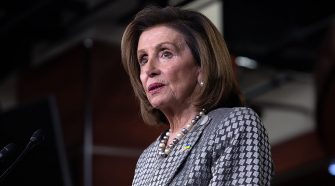Senate Minority Leader Len Fasano, R-North Haven (center), took aim at the assumed health care savings in Lamont’s budget during a June press conference.
Senate Minority Leader Len Fasano has insisted for months that Democratic Gov. Ned Lamont’s budget is unbalanced and relies on hundreds of millions of dollars in questionable savings and risky assumptions.
Fasano has now leveled a new charge against the administration and its allies, however: that they have responded to his criticisms by moving deliberations about one of the largest components of the budget — health care costs — behind closed doors.
Officials responsible for figuring out how the state can save money on health care reject this criticism, though, saying portions of their work always have relied on private negotiations. They also assert Fasano misunderstands the process and is more focused on partisan bickering than offering constructive, cost-saving ideas.
“How can I be constructive when I don’t get the information?” Fasano told the CT Mirror. “I think they’re making it up as they go.”
“How can I be constructive when I don’t get the information? I think they’re making it up as they go.”
Senate Minority Leader Len Fasano
In this instance, “they” are the 12 members of the Health Care Cost Containment Committee, a panel comprised equally of management and state employee union representatives. Created by contract in the mid-1980s, this group has been tasked periodically with studying and crafting new ways to control health care inflation.
Working with Comptroller Kevin P. Lembo’s office, which provides staffing and resources, the panel was given a daunting task by Lamont and legislators last June when they adopted a new, two-year state budget. Specifically, they must find ways to save $180 million over the biennium through “win-win” efficiencies that don’t reduce benefits to workers or retirees.
Fasano initially objected because these savings were assumed in the budget before negotiators for the state and its worker unions had any tentative deal in place.
But when the comptroller’s office solicited bids in mid-June, two weeks after the budget’s adoption, for a health care cost containment specialist to assist with the endeavor, Fasano intensified his criticism.
Labor and management officials quickly countered Fasano misunderstood the process.
The Health Care Cost Containment Committee didn’t start its work in mid-June, they said, but began decades ago and is simply continuing its regular monthly gatherings. And with that foundation of research and cooperation in place, both sides expressed confidence they would hit the cost-savings target.
Colleen Flanagan Johnson, who was Lamont’s senior advisor back in June, called Fasano “desperate, sad and tiresome,” adding that “we wish Senator Fasano would spend half as much time drafting a budget as he does press releases and composing letters.”
“[He’s] desperate, sad and tiresome. We wish Senator Fasano would spend half as much time drafting a budget as he does press releases and composing letters.”
Colleen Flanagan Johnson
Former senior advisor to Gov. Lamont
Neither the Senate nor House Republicans proposed an alternative budget this past spring.
Fasano responded to the criticism by sending his fiscal policy director, former East Haddam state Rep. Melissa Ziobron, to attend cost containment committee meetings in May, June and July.
Fasano said the panel quickly closed its meetings not long after Ziobron’s arrival. And in July, the panel voted to go into “executive session,” he said.
According to the state’s Freedom of Information Act, public boards and commissions can meet in closed, executive session to discuss a handful of specific, privileged topics. But they must cite the exempted topic before moving behind closed doors.

CTMirror.org file photo
Daniel Livingston, chief negotiator for the State Employees Bargaining Agent Coalition
Fasano wrote to management and labor officials charging the panel didn’t follow proper procedures to meet confidentially.
Management and labor officials countered there was no “executive session,” though they concede some committee members might have used the term incorrectly.
The committee actually has a dual nature, and its first, oldest responsibility — to negotiate health care savings — always has existed outside of the FOIA.
“Our core function was established by our contract in 1986, is a joint labor management effort to save money and improve employee health through ongoing negotiations, and there is no doubt it is exempt from FOIA,” said Hartford attorney Daniel Livingston, chief negotiator for the State Employees Bargaining Agent Coalition.
“We do not believe the entire proceedings of the Health Care Cost Containment Committee should be public,” said Chris McClure, spokesman for the state Office of Policy and Management, the administration’s chief budget, policy planning and labor relations agency. “The HCCCC primarily serves as a labor-management negotiation committee.”
Over the years, though, legislators and governors also have asked the group to research health care policy issues. And when the group gathers for these and other non-negotiation-related tasks, members have — voluntarily — followed open meeting rules spelled out by FOIA, Livingston said.
“We are strong supporters of FOIA, and so we have gone out of our way to conduct those functions in a public meeting. I’m sure we will continue to do so.”
Daniel Livingston
Chief Negotiator, State Employees Bargaining Agent Coalition.
That means posting meeting agendas publicly and keeping and posting minutes.
“We are strong supporters of FOIA, and so we have gone out of our way to conduct those functions in a public meeting,” he said. “I’m sure we will continue to do so.”

ctmirror.org
Comptroller Kevin Lembo.
Lembo, whose office oversees the purchase of health care services for state employees and retirees, also backed the dual nature of the cost-containment committee, saying it has led to great success.
“Collaborative policy work can be a rare thing in most states, but I’m grateful for the innovative health care policies that we’ve been able to implement as a result of these efforts” the comptroller said. “As far as procedural questions about the committee, including open meeting provisions, I defer to the labor-management leaders and the Freedom of Information Commission.”
Mary Schwind, executive manager and associate general counsel for the FOI commission, said she could not recall any recent requests for a declaratory judgment on which cost containment committee functions, if any, are subject to the state’s disclosure rules.
Fasano said he would consider pursuing a declaratory ruling if the committee continues to discuss its efforts to help balance the state budget in private.
“They don’t want us to know what’s going on,” he said. “If it’s to find savings, why can’t that be talked about in public. … I would rather work together, but if it turns out they’re going to claim this blanket exemption, then I would consider going to FOI.”
But Livingston and others involved with the committee said Fasano has done little else but criticize the budget since its enactment.
“Senator Fasano’s efforts to interfere with our core function benefits no one,” Livingston added, “and only risks impeding progress for everyone.”














